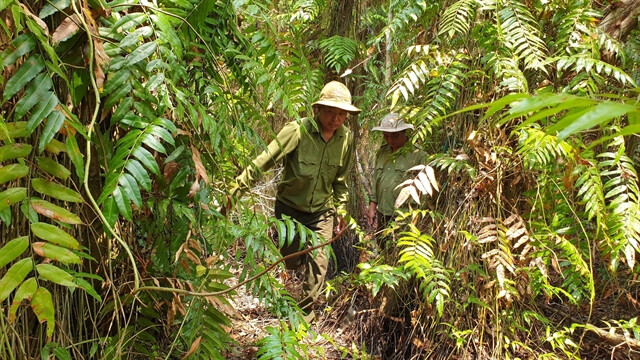
HÀ NỘI – Vietnam has launched a campaign to combat the illegal ivory trade, focusing on educating international tourists about the illegality of purchasing and transporting ivory products. The initiative is a joint effort between the Vietnam Convention on International Trade in Endangered Species of Wild Fauna and Flora (CITES) Management Authority and WWF-Vietnam.
Vietnam has become a major global transit hub for ivory trafficking, identified as the world's largest center for ivory seizures since 2018, according to the CITES Elephant Trade Information System (ETIS). Since 2008, over 70 tonnes of ivory have been seized in the country, highlighting Vietnam's critical role in the illegal trade. Recent seizures in early 2023 and 2024 involved over eight tonnes of ivory, transiting through multiple countries before being intercepted.
Chu Ngọc Quân, deputy director of the CITES Management Authority of Vietnam, emphasized the high level of protection afforded to both Asian and African elephants under CITES Appendix I and within Vietnam's own endangered species list. He acknowledged the grim reality of elephant poaching and killing worldwide.
WWF-Vietnam reports that Southeast Asia and China account for 90% of global ivory seizures, with Vietnam responsible for 34% of detected imports and hosting the largest seizures globally. Much of the carved ivory in Vietnam is trafficked to markets like China and the United States, while some is sold domestically to locals, international tourists, and online.
Tourism plays a significant role in facilitating the illegal ivory trade, with some tourist destinations displaying and selling wildlife products, including ivory. Many tourists mistakenly believe that purchasing ivory in Vietnam is legal. The campaign aims to directly address this misconception by educating visitors and encouraging businesses in tourist hotspots to provide guidance on avoiding illegal and environmentally harmful activities.
Funded by WWF-US, the communication campaign will be rolled out in four major Vietnamese cities and at four international airports. Key visuals and messages will emphasize the illegality of ivory use and trade. The campaign targets international tourists passing through these key transit points.
"With the strong recovery of tourism after the COVID-19 pandemic, wider communication methods need to be applied to easily reach international tourists and prevent the purchase and sale of ivory products in Vietnam,” said Quân.
Thibault Ledecq, chief conservation officer at WWF-Vietnam, explained that the campaign’s goals extend beyond raising awareness. It also aims to promote collaborative efforts to protect wildlife. “We will organize communication activities, workshops and community events to educate, warn about the consequences of using ivory, as well as encourage community action in protecting elephants in Vietnam and beyond,” he said.
[Copyright (c) Global Economic Times. All Rights Reserved.]






























